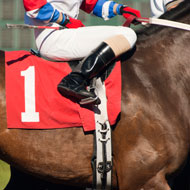Two horses test positive for
controlled substances

A total of 137 horses were tested in the first week of the Equestrian Games.
The International Federation for Equestrian Sports FEI has announced that two horses competing in the World Equestrian Games have tested positive for Controlled Medication substances.
Controlled Medications are substances that are regularly used to treat horses but which are not allowed in competition in order to maintain a level playing field.
Samples taken on August 28 from the horse Tra Flama, ridden in Endurance by Giliese de Villiers from the Republic of South Africa, have returned positive for Phenylbutazone and its metabolite Oxyphenbutazone. Phenylbutazone is a non-steroidal anti-inflammatory used for the treatment of pain. Tra Flama was vetted out at the second Vet Gate on the Endurance course.
Samples taken on August 29 from the horse Qalao des Mers, ridden in Eventing by Maxime Livio of France, have returned positive for the Controlled Medication substance Acepromazine. Acepromazine is a sedative. Qalao des Mers finished fifth individually and was a member of the fourth-placed French team.
FEI Secretary General Ingmar De Vos said; "It is the first duty of a regulator to ensure clean sport and a level playing field and we do this by conducting an ongoing and very comprehensive testing programme. We had clean World Equestrian Games in 2010 in Kentucky and at the Olympic and Paralympic Games in 2012. Our system works and sends out a strong message to our athletes and their entourage that clean sport is our absolute top priority.
"We carried out an intensive awareness campaign prior to the Games and also offered pre-arrival testing to all participants, so it is very disappointing that we have two positives for Controlled Medication substances at the Games, especially when it is well known and well accepted that both these substances are not permitted in competition. Although these are Controlled Medication not doping substances, we take this very seriously."
The FEI has confirmed that all equine samples taken in the first week of the Games in the disciplines of Dressage, Para-Dressage and Reining are negative, and that there are no other positives in Endurance and Eventing. A total of 137 horses were tested in the first week of the Games – 49 in Endurance (28 per cent of 173 starters), 24 in Eventing (26 per cent of 91 starters), 22 in Dressage (22 per cent of 100 starters), 21 in Reining (26 per cent of 82 starters) and 21 in Para-Equestrian Dressage (21 per cent of 100 starters).
In addition to random testing, the FEI conducts compulsory testing of all individual medal winners at the World Equestrian Games, and at least one horse from each of the medal winning teams.
The Controlled Medication positives will not result in an automatic provisional suspension, but will go before the FEI Tribunal after the Games at a date to be agreed between all parties. As at the Olympic Games, a positive result for a team member can result in the disqualification of the whole team. In the Qalao des Mers case, this could mean disqualification of the French Eventing team and loss of Olympic qualification for Rio 2016. It is the role of the FEI Tribunal to rule on what sanctions apply.



 The Federation of Independent Veterinary Practices (FIVP) has announced a third season of its podcast, Practice Matters.
The Federation of Independent Veterinary Practices (FIVP) has announced a third season of its podcast, Practice Matters.